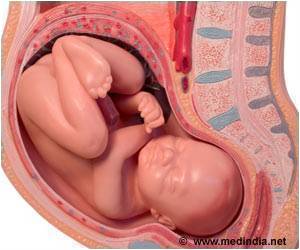Preeclampsia is a major cause of premature delivery and both maternal and fetal death and the most common complication of pregnancy. Yet what causes the syndrome remains unclear.

"Preeclampsia is a multifaceted complication found uniquely in the pregnant patient and one that has puzzled scientists for years," says the leader of the study, Mohammad N. Uddin, a research scientist and assistant professor in the obstetrics and gynecology department of the Scott & White Healthcare/Texas A&M Health Science Center College of Medicine in Temple, Texas.
Preeclampsia affects about 5 percent of expectant moms, usually in the second half of pregnancy. "By conservative estimates, these disorders are responsible for 76,000 maternal and 500,000 infant deaths each year" around the world, according to the Preeclampsia Foundation. Preeclampsia's hallmarks are high blood pressure and an overload of protein in the urine. Treatment options are limited, but the syndrome eventually goes away after birth.
During pregnancy, the placenta functions like a trading post of sorts: Inside the pancake-shaped organ, maternal and fetal blood is trucked through, nutrients and oxygen are delivered to the developing fetus, and waste products are shipped out for disposal. All of that life-sustaining traffic requires a multitude of molecular signals, and Uddin's study zeroed in on the bad signals that may be involved in preeclampsia.
Uddin's team compared protein expression in samples from placentas and umbilical cords of 10 women who had experienced preeclampsia and 10 who had not. (The researchers also conducted the same analysis with rats.) They found that proteins that signal both cell stress and cell death were significantly higher in samples taken from the women who had experienced preeclampsia, Uddin says.
"Stress and (programmed cell death) signaling was upregulated in preeclamptic placentas and umbilical cords compared with normal pregnancies," Uddin says. In fact, the ratio of molecules Bax/Bcl-2, which is involved in programmed cell death, was increased 1.4-fold. Meanwhile the molecule Cox-2, which is related to inflammation, and the enzyme p38 MAPK, which is related to cell stress, were increased 2.5-fold and 3.0-fold, respectively.
Advertisement
In addition to analyzing what molecules were more pronounced in preeclampsia, the researchers were interested in learning more about the effects of the syndrome on study participants' babies. They found that the average hospital stay for preeclampsia babies was significantly longer: Those newborns stayed six days on average, while the babies born to mothers without preeclampsia stayed a little over three days on average.
Advertisement
Uddin noted that there are numerous well-known effects of preeclampsia on babies: "These long-term effects are increased risks of hypertension and type 2 diabetes mellitus, aortic wall thickening (an early marker of atherosclerosis in children), increased risk of stroke, intellectual disabilities, hearing disabilities, neurodevelopmental delay, cerebral palsy and an increased risk of metabolic disorders."
Uddin says that the team's identification of the molecules overexpressed in the tissues from preeclampsia patients raises the possibility that those signals could be therapeutically blocked one day.
Source-Eurekalert










